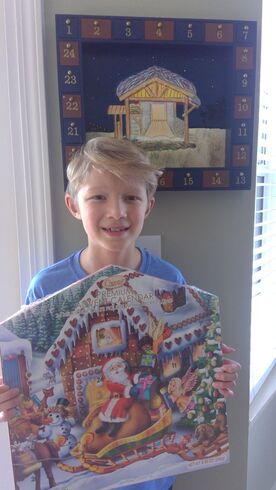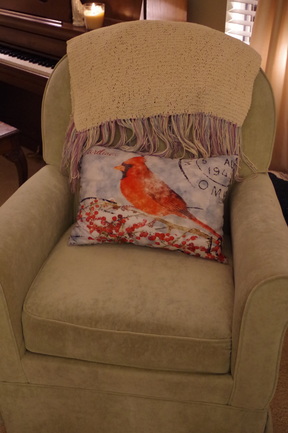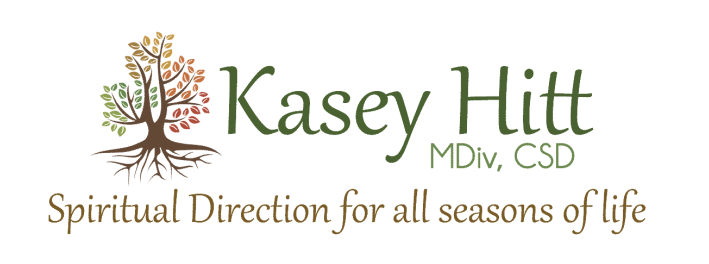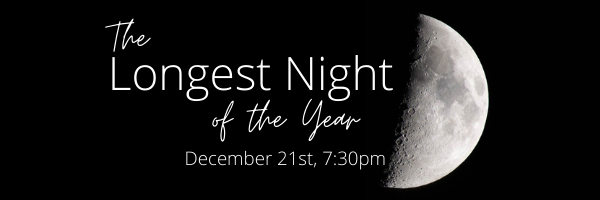|
For some of us, Christmas is not experienced as "The Most Wonderful Time of the Year." For all who find themselves in this place, my husband, Russ, and I have offered The Longest Night of the Year Service on or around the Winter Solstice. A friend suggested it to us and after the first gathering in a small, country church over a decade ago, we knew it was something we wanted to continue. The service offers a safe space to acknowledge mixed feelings surrounding the holidays, to join together in lament and longing, and to simply step away from the rush of the season and breathe. Usually Russ offers only instrumental music during the short, 30 minute service but last year we offered the service via Zoom and he created a video with his only song with lyrics, "Some of Us," on his album, The Longest Night. Click on it below, listen and watch. Perhaps there's an image or lyric that connects with your own lament and longing, something that speaks to your soul. As to this year, we are offering the service online once again knowing more people can participate this way. I invite you to join me and a handful of others from Wisdom Tree Collective and Friday Morning Centering Prayer as we allow instrumental music, art from local/regional artists, laments and longings from Scripture, and Creation's own rhythm to companion us in the dark. Tuesday, December 21st 7:30-8:00pm CT Email me for the Zoom link. With darkness falling earlier, I have looked forward to the growing number of lights as I drive through my neighborhood. The display increases with each passing day!
Childlikeness, anticipation, playfulness, joy, and magic are part of the season. So is pressure, overstimulation, exhaustion, loneliness, anger, and grief. Some years it is more one than the other, isn’t it? Other times it is a mix. The good news is that God is with us (& found) in both—moments that look & feel light and those that look & feel dark. Said the Psalmist (139): 11 If I say, “Surely the darkness will hide me and the light become night around me,” 12 even the darkness will not be dark to you; the night will shine like the day, for darkness is as light to you. Our culture does a good job celebrating God in the light, but rarely guides us to discover God in the dark, especially during Christmastime. For some, the idea of God seeing us in the dark inspires more fear than comfort! However, the Psalmist is extolling the wonder of being seen by God, even when he cannot "see" God. When all is dark around us, God is still there, within and without. Do you have the inner eyes to see (& receive comfort)? Perhaps it is time to let yourself befriend the darkness or rather let yourself be befriended in the dark.
“Are you afraid of leaving your congregation alone in the dark with God?” I asked a pastor who simply could not understand why I would blow out all candles during a Longest Night Service.
He’s not alone. We tend to rush to bring light into darkness in the same way we rush to fill silence with sound. Pastors, especially so. They feel the weight of proclaiming and reminding. Wanting to make sure people know there is hope and “Jesus is the Light,” they constantly talk about hope, repeat Jesus’ name, and keep the lights on, candles burning. Honestly, they’re just as afraid of the dark as most. As a Spiritual Director, I’ve had plenty of pastors on silent retreats and plenty who don’t want to come at all because silence is scary. It seems unproductive and too revealing…which is more frightening?! Given my years as a church staff member and years working with church staff members, both are equally so. So much so, some never dare to come or they walk away from the discomfort never to return to a silent retreat. But discomfort is a doorway to deep transformation. And pastors can be like helicopter parents trying to shield those in their charge from the awkward and uncomfortable feelings that come with silence and darkness. But, have you ever experienced God in silence? In darkness? I have. I’ve also watched and listened to stories of how others have experienced God in silence and darkness. And guess what naturally arises? Hope. And guess where people discover the Light of Christ? Arising in their midst, even from within their very selves! After all, God is everywhere--within and without. The Psalmist proclaims in Psalm 139:12, “Darkness and light are alike to You.” Then he goes on to talk about God forming him in his mother’s womb (another place of darkness where God is present and at work). No lights needed. God is there. And are we not born from our mother’s womb and continue in the womb of the God in whom we live, and move, and have our being? Light and dark are part of every life and God is with us equally in both. Jesus taught that the Kingdom of God is in our midst, even within our very being (Luke 17:21). So we do not have to be afraid of the dark, the inner light never goes out. It just may take some time (& discomfort) to become aware of it. 14th century Persian poet, Hafiz of Shiraz, echoes this reality when saying, “I wish I could show you when you are lonely or in darkness the astonishing light of your own being.” For some reason this scares us, so we look to pastors to talk to us about the Kingdom rather than experience it for ourselves. However, when a pastor (or anyone!) dares to sit in the discomfort of darkness and silence, allowing uncomfortable feelings to emerge and giving themselves permission to rest from all the doing, they begin to radiate trust. This trust allows them to entrust those in their care to the discomfort of silence and darkness because they know God will meet each person in whatever way is needed. Right before an overnight silent retreat a person came up to me after dinner and in all seriousness said, "I'm on the verge of a panic attack the closer we get to going into the silence, I don't know if I can do this." I replied, "I can see why it's scary to you. Know there is a nurse here if needed. And, you're free to leave, but I hope you'll give the silence a try." The person stayed and now they sign up for almost every silent retreat! In befriending silence and darkness, the discovery is made that rather than be afraid of them, they in fact, can be a gift—an opportunity to be still and know that God is everywhere, in our mist, within our very being. A few weeks after talking to the one pastor, another emailed me and asked if her Presbyterian Church in North Carolina, could use my liturgy for their Longest Night Service. Mine had been the first liturgy she had come across that included blowing out candles and letting people simply be with God in the dark. She thought it would be powerful, especially this year, to let her congregation experience God’s presence in the darkness. I could not help but smile. _____________________________________
Advent is a time of gestation. Much like the discomfort and anticipation of pregnancy, we wait on the arrival of what is deeply hoped for and anticipated.
A few weeks ago I was in a sensory-deprivation tank floating on 1500 pounds of salt. It's supposed to be (and usually is) relaxing but that day I kept squirming around...like a baby in the womb. Last year I went to a Benedictine Sister for both Spiritual Direction and healing touch at a monastery where I would be facilitating a retreat the following day. During the time of laying on of hands, when she got to my abdomen she said, "We are in the womb of God who is birthing us. Birth pains are difficult, but we WILL be born." I teared up as I heard these words of deep hope, because I had been restless then, too. In liminal space, I felt the strain of being "betwixt and between," especially in relationship with my own religious institution where the leadership continued pulling back from engaging contemplative practice with each passing year. Knowing the transformative power and wholeness found in contemplation and action, I continued to hope. What this hope looked like in regard to my faith community, I found myself full of questions with no easy or sure answers. Her words of hope spoke to my soul but did not take away the struggle. Contrary to idealistic views of hope, theologian Jurgen Moltmann (known as the theologian of hope), writes in Experiences of God, "...whenever faith develops into hope it does not make people serene and placid; it makes them restless. It does not make them patient; it makes them impatient. Instead of being reconciled to existing reality they begin to suffer from it and to resist it." The Sister's words of hope gave me deep permission to accept the struggle and discomfort as part of the process of rebirth. When I realized that it was not wrong, but natural, to be squirming in the float tank, I found myself smiling with a newfound acceptance. Instead of trying to be still, I playfully allowed my arms and legs to stretch and move however they wanted. It felt freeing. If I could allow this restlessness in the float tank, how about other in places of my life? After all, Saint Paul reminded the people in Athens of the perennial truth of their own Greek poets when he quoted, "For in him we live and move and have our being." Sometimes we rest, sometimes we walk, sometimes we wriggle in the womb of God. _____________________
 Alex with his magnetic and chocolate Advent calendars (thanks to a friend for the latter!) Alex with his magnetic and chocolate Advent calendars (thanks to a friend for the latter!) We've got magnetic, chocolate, and cheese Advent calendars and we've just started lighting our Advent candles, but something my daughter said stopped me in my Advent tracks. "I hate taking down our fall decorations, I feel like I missed out on enjoying them as much as I could have." To which I replied, "But you're in the house all day, everyday!" (She's doing virtual school the entire year.) To which she replied with a smile, "But I'm worrying a lot, so am I REALLY here?" We both laughed. But I heard her longing and it got me thinking about how we often miss the gifts that are right in front of us like beauty, rest, fun... She is often busy with virtual classes during the day and often does homework right before bed. We're often busy with work and household chores during the day and often are on our phones or falling asleep watching Netflix. Days and evenings can easily come and go in a whir of busyness and distraction. So a few hours later, I said, "I have an idea. Every evening before bed beginning December 1st, let's put down phones and homework, shut off the television, and turn off all the lights except for Christmas lights and candles. Let's sit in silence together for the number of minutes matching the day it is, which means we begin with 1. You can sit or lie down, eyes open or closed, and just take in the surroundings. What do you think?" My daughter and husband were on board immediately, my 10-year-old son nodded slowly but with some skepticism (which makes me particularly excited for him!). So I'll set my Centering Prayer timer for 1 minute tonight and we'll enter into the Silence. A new Advent practice. Doing nothing. But present to everything. __________________________ Whether in the morning, during a lunch break, or before bed, whether the 1st or 14th, you might experiment with Silence as both a way of entering into and a companion during this Christmas season.  Sitting around a campfire years ago, I led a group of seminarians and professors in a time of silence. Afterwards, one of the professors shared that not long into the quiet she began to smell something unsavory. After a few moments, she realized the smell was body odor and a moment later realized it was her own! Her first response was shame. Since it was at the beginning of our time she decided that rather than get up and leave, she would sit with her shame and her body odor in the holy silence. And slowly she began to feel the love of God envelop her and speak lovingly to her from within herself. Within minutes she went from shame to accepting and even appreciating her humanity. This is the humanity the Son of God entered long ago. Although we clean up the site of Jesus' birth in story and song, the reality is he was born in a barn of some sort. He was born to parents who had been on a long, dusty journey. And if you've ever been present at a birth, you know it's not neat and tidy. Consider those smells. You could say the site and smell of his birth was as shameful as the site and smell of his death. As an adult, Jesus continued to enter deeply into humanity even using dirt (humus) and spit to heal. What some may consider gross he transformed into a means of grace. Maybe Jesus was telling us something about being human. You don't need to be ashamed. Shame is a lonely place, it has been from the beginning (just ask Adam & Eve or the professor sitting at the campfire!). Jesus' own lineage, his family tree, was marked by shame--adultery, incest, prostitution and murder (as well as people who did little to make a name for themselves, good or bad)! Yet it is here, from and among the lonely, shameful places and people that Jesus was born, lived and died. What do we make of this? Clearly God is up to something. This story has something to say. Here is a God who from the moment humanity felt shame and hid, entered in with words and care (Genesis 3). Then when they came out of hiding, offered them the hard work of love as the pathway to transformation. The Incarnation, this Word becoming flesh in Jesus, reiterates and provides an exclamation point--it's into our shame where God chooses to come and again offers transforming love. Had she not noticed her body odor and allowed God into her shame, the professor may have missed the Holy Voice speaking words of love to her. She could have missed the Beloved leading her to accepting and appreciating her own humanity (which then overflows into accepting and appreciating the humanity of others). Yes, Christmas is full of good smells (fresh pine, cinnamon, gingerbread, peppermint and orange) and we can certainly celebrate those. But what if we miss the message of the manger because we're overly focused on the savory? What are the unsavory parts of the season? Where are you most experiencing shame and loneliness in your life right now? In other words, what or where are you hiding? Perhaps if we come out of hiding and acknowlege what "stinks" we may witness anew the Christ who was born in an ancient barn and laid in a manger. Jesus is the face of God, the One who comes to us right in our humanity (especially there) with Good News, transforming our stench into an aroma pleasing to the Lord. Breathe deep!  I hate the phrase "holiday rush." It seems like a cultural expectation. It's one I can let myself get catapulted into way too easily. Whether it's allowing my December to fill up or speaking and acting like I'm constantly behind or my to-do list is bearing down on me. Plus the holidays can really bring my compulsive perfectionism to the surface which adds yet another layer of drivenness. How present are you when you're rushing to buy presents? How much of the Christmas season are you truly enjoying as you try to attend and do everything you're "supposed to" in order to make the days merry? I can barely listen or see anything when in a hurry. And taste...how much of my meal (especially those holiday treats!) do I actually taste when I'm in a rush? Not much. When the Psalmist reminds us to "taste and see that the Lord is good" (Psalm 34:8), I don't think that can happen if we're too caught up in the hustle and bustle. The next line of the Psalm says, "blessed is the one who takes refuge in him." Do I even stop long enough to allow God to be a refuge? Not nearly enough. I don't know about you, but I want to taste more of that blessing. What if we join God in the present by tasting? It can be our Advent practice this week. Rather than rush a meal, gulp down a cup of coffee or gobble the Christmas cookie, let's...
What will we discover? How will it shape our day? I wonder if it will allow us some needed space to notice how God is present with us, already offering us refuge (and other good gifts). Perhaps in doing something as simple as tasting, we'll taste the goodness of God.  "It's going to be a long Advent," my friend said. She's experiencing and anticipating a long period of darkness. I, too, lament as I listen to the losses of those I sit with in spiritual direction or read news and see images of tragedy and anxiety around the world. Advent's holy invitation is to get in touch with our longing for the Light to come--for hope, peace, joy and love to return to our lives and to our world. Even when the night grows long and deepens, we wait. So how do we survive the dark? Mira, an early 16th century poet in India who knew suffering and helped others who suffered, wrote the following lines: I know a cure for sadness: Let your hands touch something that makes your eyes smile. I bet there are a hundred objects close by that can do that. My eyes smile when I think of my daughter's hand in mine, the coziness of a certain blanket, the fluffiness of the neighbors' cat who comes over for a daily visit, the smoothness of a stone with the word "TRUST" carved into it...but what do my eyes fall on in this moment? For THIS moment is where God comes to meet me. It's my mint green velour rocking chair. An ordinary object found right where I am. THIS is where God finds me, right where I am. And there's beauty there, MIra reminds me. So without a book or something to accomplish, my eyes smile as I sit down in this chair that tenderly holds me in the dark.
May you touch something that makes your eyes smile and in doing so be reminded that God is near...no matter how dark.  The ordinary routines of life can lull us to sleep. Did you notice anything new when you looked in the mirror upon waking? How about when you drove to work this morning? What if I told you to look again? What would you see that you didn't see before? The hypnotic quality of our routines can cause us to become blind and deaf to the Spirit of Life moving through our lives in ways that often go unnoticed. In Matthew 24:37-44, Jesus used the images of a flood, kidnapping and thieving to emphasize his words, “Keep awake therefore, for you do not know on what day your Lord is coming...Therefore you also must be ready, for the Son of Man is coming at an unexpected hour.” Was Jesus wanting people to fear him or using fear to describe God's ways? I don't think so (children would never have been drawn to Jesus and He wouldn't have told people they must become like them to see the Kingdom). It helps to know that Jesus was a master at using hyperbole when teaching in order to break through the mind's predictability. We tend to get as hung up on the hyperbole as we get lulled by the ordinary. So what is Jesus saying? Perhaps it's as simple and difficult as this: Observe. Discern. Act with justice and kindness. The Old Testament prophets railed against the people's lack of these as they went about their ordinary lives and religious routines. They chose to be comforted by voices telling them what they wanted to hear...all was fine, nothing needed to change. And those who needed things to change continued to suffer. This preference for ignoring the prophetic voice and sleep-walking through life was as routine as the ordinary itself. Just look at the question and Jesus' response to those "asleep at the wheel" in Matthew 25, “'Lord, when did we see you hungry or thirsty or a stranger or needing clothes or sick or in prison, and did not help you?' And his reply was, ‘Truly I tell you, whatever you did not do for one of the least of these, you did not do for me.’" It's in the middle of our ordinary, busy or boring, lives that we're to keep watch. That's the context of God's arrival (the definition of Advent). Are we too caught up in our own predictable story-lines to see it? A friend of mine, a long-time nurse, texted me Sunday night (the first day of Advent). She was so full of rage. After having observed the immigrant patients and their families post-election, especially the children, she noticed a change. The children and teenagers were silent. Not even saying “hello.” After watching this time and again with her patients, whether from Mexico or India, she became inflamed. It threw a wrench in her ability to go through the motions believing everything is fine (and even more distasteful to clothe it in religious language like, “God is in control.”). Her text encouraged me. It's the perfect way to begin Advent. She broke her normal nursing routine. She observed. And she saw fear. Maybe that's one reason we don't want to “keep awake.” We really don't want to see the fear in the immigrants' eyes. We'd rather not see the exhaustion in our own or the sadness in our spouse's. We don't want to see Christ lying in an animals' food trough. So we clean it up and make it a presentable decoration, just like we put on a happy face and show up at our ugly Christmas sweater work party. It's risky to ready oneself to really see. In my mind's eye, I saw my friend's kind face as a light in the darkness for her patients. She allowed herself to be a witness. She really saw these children. And in doing so she became an intercessor. Pouring out her complaint of injustice, her anger and deep sadness as a Psalmist's lament to God. And she became an agent of healing. She's not yet sure what her next steps will be toward change. While she gathers and sifts through what she's noticing (the meaning of discernment), she need not underestimate her presence, words and touch in the moment. For according to Matthew 25, each time she sees and comforts those who are fearful, Jesus says she sees and comforts Him. To truly be seen is a cup of water to a parched soul. Do you remember the last time you were seen? And seeing is a holy “yes.” Like Mary, the Mother of Jesus, we, too, are invited to be the vehicle through which God comes into the world. It's our bodies through which God sees, listens, touches and offers hope and healing to all of Creation. Join me this Advent season, let's look again.
|
AuthorKasey is a scarf, ball and club juggling spiritual director just outside of Nashville, TN. Play helps her Type-A, Enneagram 1 personality relax, creating space for poetry and other words to emerge. She also likes playing with theological ideas like perichoresis, and all the ways we're invited into this Triune dance. Archives
January 2024
Categories
All
|
By clicking “Sign up for E-News” I consent to the collection and secure storage of this data as described in the Privacy Policy. The information provided on this form will be used to provide me with updates and marketing. I understand that I may modify or delete my data at any time.


 RSS Feed
RSS Feed

